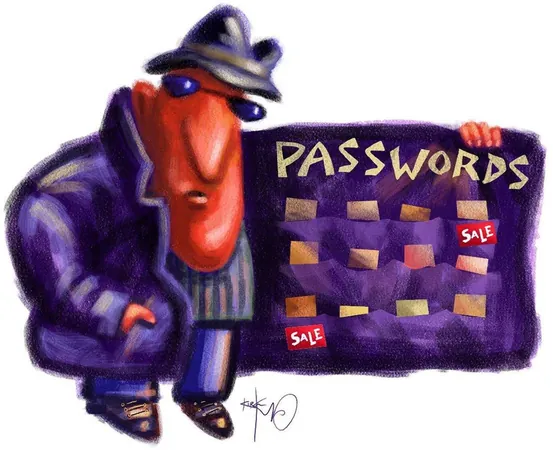
Say Goodbye to Passwords: The Rise of Passkeys as a Safer Alternative
2024-11-20
Author: Jessica Wong
As digital security continues to evolve, both 1Password and Google have put the spotlight on a pressing issue: passwords are outdated and more vulnerable than ever. Both companies, renowned in the realm of cybersecurity, are advocating for a shift towards passkeys, a more secure and user-friendly alternative that eliminates the risks associated with traditional password usage.
Passkey Adoption is Taking Off
According to insights shared by Anna Pobletts, the head of passwordless technology at 1Password, there has been a significant spike in passkey adoption over the past year. Currently, approximately 29% of 1Password users have at least one passkey saved, translating to over 2.1 million monthly passkey authentications. This remarkable shift began with 1Password's launch of passkeys in September 2023, accumulating an impressive 4.2 million saved passkeys by early 2024. A noteworthy surge in adoption occurred around mid-April 2024, shortly after a major platform, X (formerly Twitter), announced passkey support for iOS users. What's more compelling is that 73% of individual users are opting for passkeys, whereas only 27% are from business accounts.
The corporate world is also catching on, with the number of companies integrating passkeys into their login options doubling within a year. More than 200 organizations—including giants like Walmart, Amazon, Target, and PlayStation—now offer passkeys as a secure login method. In fact, Amazon recently reported that over 175 million customers are utilizing passkeys to access their accounts.
Why Are Passkeys Better?
The security and efficiency of passkeys stem from their inherent technology. Passkeys operate using a public/private key pair, where the public key is stored on a server and the private key resides safely on the user's device. This means that since the private key is never transmitted during authentication, the chances of interception or unauthorized access are drastically minimized. Google has emphasized that passkeys are not only quicker and more secure than passwords but also offer a seamless user experience.
1Password's Chief Product Officer, Steve Won, succinctly explains, “Passkeys are nearly impossible for hackers to guess or intercept because the keys are randomly generated and never shared during the sign-in process.”
What’s Holding Back Mass Adoption?
Despite the clear advantages, you may wonder why passwords haven’t become obsolete yet. Pobletts points out that years of reliance on passwords have made them ingrained in our culture; thus, the transition to passkeys requires education and comfort on the part of consumers. “For wide-scale adoption, it’s crucial to raise public awareness and promote the benefits of passkeys,” she emphasizes, highlighting that further educational efforts can alleviate the transition for both organizations and individual users.
The Superiority of Passkeys
Here’s why embracing passkeys is essential: 1. Intrinsically Strong: Passkeys are generated with complexity, making them nearly impossible to guess. 2. Sturdy Against Phishing: Because there are no credentials to steal, the common methods hackers use to obtain information become irrelevant. 3. Effortless Use: Passkeys are automatically generated, eliminating human error. Users can authenticate effortlessly, often using biometric data like fingerprints or facial recognition.
What If Your Device Is Compromised?
Anticipating common concerns, Pobletts assures users that passkeys provide more security in cases of device loss or theft. The synchronization of passkeys across devices means that users can recover access through their account provider, even if they lose their device. Companies are also responsible for enabling account recovery options to ensure users remain protected in any scenario.
The Future of Digital Security
With initiatives spearheaded by organizations like 1Password and the FIDO Alliance, the digital landscape is on the verge of a major transformation. By 2025, innovations are expected to facilitate easier passkey management, including the ability to import and export passkeys seamlessly. “We’ll see enhancements that allow for automatic passkey creation and multi-domain usage, providing a streamlined experience,” Pobletts predicts.
The writing is on the wall: passwords may soon become a relic of the past. With passkeys leading the way, we stand at the brink of a new era in cybersecurity—one where your digital life can be more safe and secure than ever before! Don’t let this shift pass you by; embrace the future of authentication today!





 Brasil (PT)
Brasil (PT)
 Canada (EN)
Canada (EN)
 Chile (ES)
Chile (ES)
 España (ES)
España (ES)
 France (FR)
France (FR)
 Hong Kong (EN)
Hong Kong (EN)
 Italia (IT)
Italia (IT)
 日本 (JA)
日本 (JA)
 Magyarország (HU)
Magyarország (HU)
 Norge (NO)
Norge (NO)
 Polska (PL)
Polska (PL)
 Schweiz (DE)
Schweiz (DE)
 Singapore (EN)
Singapore (EN)
 Sverige (SV)
Sverige (SV)
 Suomi (FI)
Suomi (FI)
 Türkiye (TR)
Türkiye (TR)